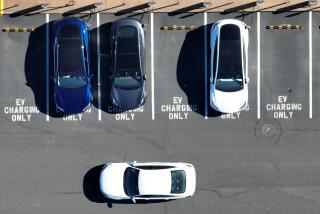House OKs aid plan for automakers
- Share via
WASHINGTON — Acting with unusual speed and bipartisanship, the House of Representatives on Wednesday approved funding for a $25-billion loan program to help the auto industry build more fuel-efficient vehicles.
The aid package enjoyed support from both parties because of its election-year importance to battleground states such as Michigan and Ohio, where many cars are manufactured.
Supporters portrayed the bill as small change compared with the $700-billion Wall Street bailout proposed by the Bush administration, and Michigan lawmakers said they were preparing to seek another $25 billion over the next three years.
“In the midst of all the economic dark clouds that are in the sky, it’s nice to report a bright spot this morning,” Sen. Carl Levin (D-Mich.) said at a Capitol news conference.
But critics denounced the loan program as a boondoggle.
“This would set a horrible precedent for companies in other sectors of America’s economy,” the National Taxpayers Union said in a statement. “If troubled firms seek revitalization, they should restructure their businesses the way millions of families have had to restructure their budgets, rather than bellying up to Congress’ trough.”
General Motors Corp., Ford Motor Co. and Chrysler, whose executives lobbied hard on Capitol Hill to fund the low-interest federal loans, said the aid would help an important U.S. industry that is struggling in a difficult economy as the companies work to meet stricter miles-per-gallon rules mandated by Congress last year.
The measure doesn’t explicitly exclude foreign automakers. But as the original guidelines were written, the loans were intended to help manufacturers transform older factories to produce a new generation of vehicles, and most foreign automakers don’t have U.S. facilities old enough to qualify for the aid. Loans would also be available to suppliers in the auto industry.
The loan program was included in a massive spending bill that Congress must pass before adjourning for the fall campaign. It was approved by the House 370 to 58 and now goes to the Senate for expected approval.
The stopgap spending measure was needed to keep the government running into early next year, when a new president will take office, after the Democratic majority in Congress was unable to agree with President Bush on spending levels for the new fiscal year that begins Wednesday.
The spending measure includes $23 billion in disaster aid for such places as the hurricane-stricken Gulf Coast and flood-ravaged Midwest. It also doubles the amount of energy assistance to help low-income families pay home heating and air-conditioning bills, setting aside $5.1 billion.
California’s share of the energy assistance would jump from $103 million to $225 million, according to the National Energy Assistance Directors’ Assn.
In California, a family of four with an annual income of $42,427 or less is eligible for the utility-bill assistance, though the legislation allows the state to raise the eligibility level.
The measure omits an extension of the long-standing ban on new oil drilling off much of the U.S. coast. The ban is set to expire Tuesday night, but supporters hope to renew all or part of it next year.
As for the auto industry loan program, backers insisted that it was not a bailout and said the money would be repaid. They noted that a so-called bailout program that provided $1.5 billion in loan guarantees to Chrysler in 1980 turned a $313-million profit for the government.
The Energy Department has not yet written all the regulations for the loan program, and it is unclear how the funding would be divided. Automakers would be able to repay loans over as much as 25 years, and the Energy Department would have discretion to defer repayment for as long as five years.
Automakers hope to pay about 5% interest on the loans, instead of rates as high as 20% they are paying to borrow money currently, in part because of their poor credit ratings. That would save them about $100 million a year for every $1 billion in loans.
Lawmakers from Michigan, which leads the nation in unemployment with a rate of 8.9%, were joined by executives from General Motors, Ford and Chrysler, the congressional Auto Caucus and 10 state governors in lobbying for the loan program. They argued that it was crucial because the crisis in credit markets had raised borrowing costs.
The loan program drew criticism from Taxpayers for Common Sense, a watchdog group.
“Boosting the automakers’ bottom line may make good political sense with Michigan a battleground state, but it doesn’t make sense for taxpayers who risk being stuck with yet more debt,” the group said.
--







